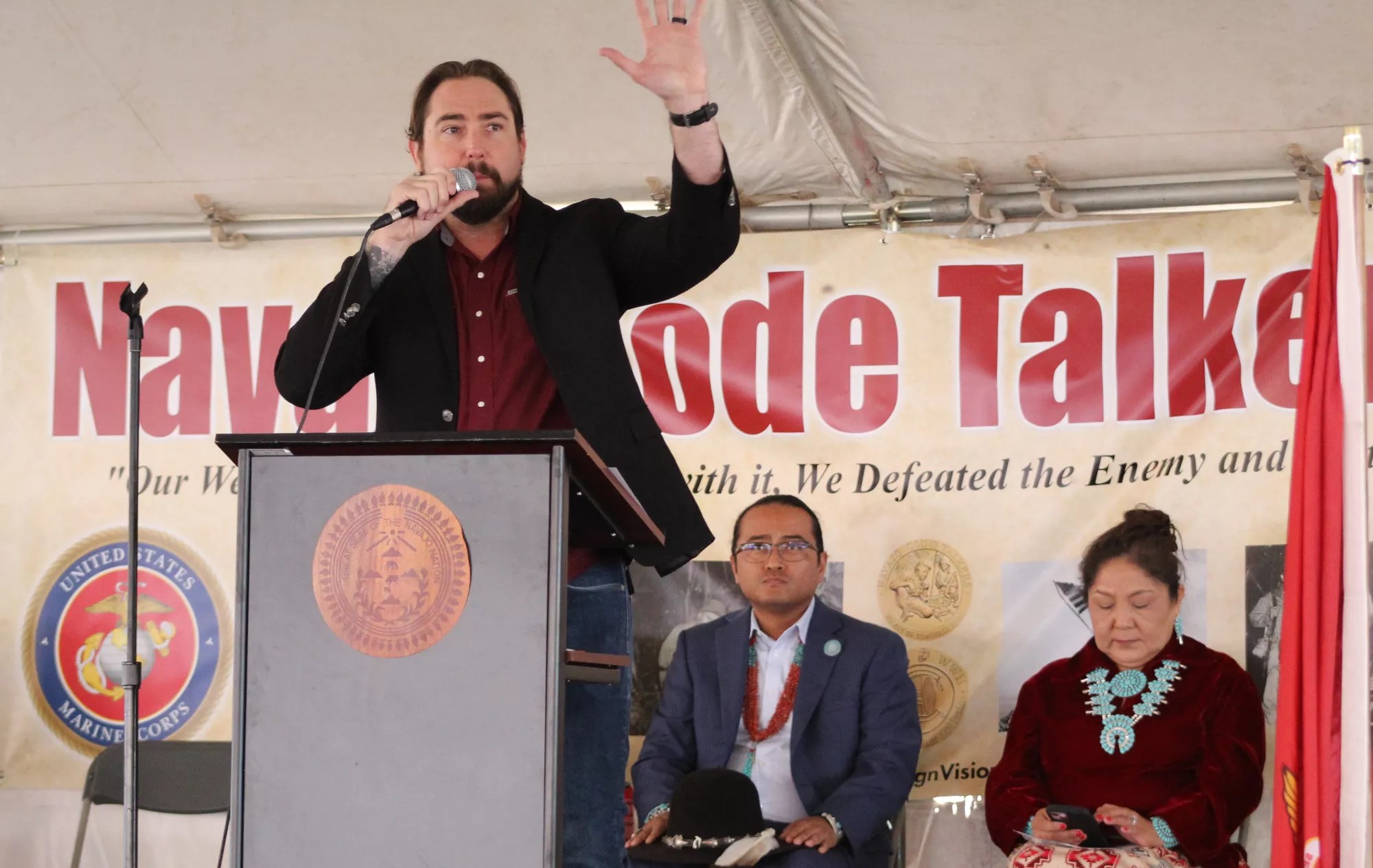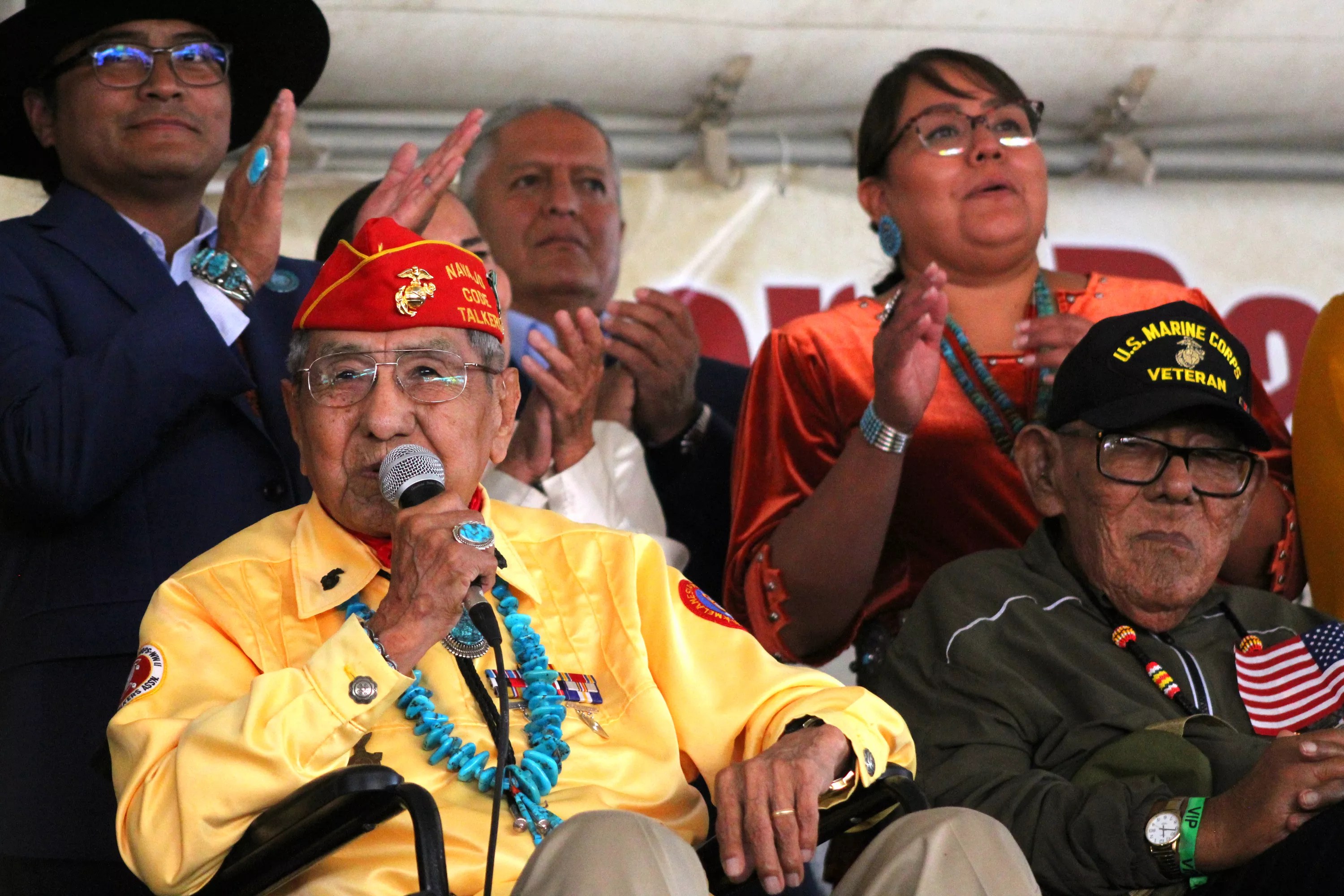
TJ L’Heureux

Audio By Carbonatix
In August, Republican Rep. Eli Crane stood on a stage in Window Rock to speak to hundreds of constituents in the Navajo Nation. It was Navajo Code Talkers Day, and Crane was there to honor the Navajo men whose unbreakable code proved essential to defeating Japan in World War II.
“I really appreciate all the men and women from the Navajo Nation who have served this country,” said Crane, a Republican and former Navy SEAL, “and especially want to pay homage to those code talkers that helped us win World War II and disrupt the evil cancer that was spreading around the world.”
His remarks generated applause from the largely Diné crowd.
Two of the last living code talkers were there that day, though one of them – John Kinsel Sr. – would die at 107 a couple of months later. With Kinsel’s death, the country lost one of the remaining links to an important chapter in its history. The legacy of the Navajo code talkers will have to live on through the retelling of those who weren’t around to witness it.
Unfortunately, references to the code talkers are disappearing on federal websites faster than the world is losing the code talkers themselves. On Monday, Axios reported that the Department of Defense and U.S. Army had scrubbed webpages dedicated to the code talkers from their sites. The erasure appears to be a response to Donald Trump’s war against diversity, equity and inclusion, or DEI.
Despite his effusive praise in August, Crane has not commented on the deletions. But a host of figures in Arizona and beyond have blasted the move. Arizona’s two senators, Ruben Gallego and Mark Kelly, respectively, called the deletion “shameful” and “a slap in the face to the Navajo community.”
Former Navajo Nation president Jonathan Nez, who unsuccessfully ran against Crane in November – and who did not attend the same Window Rock celebration Crane did – told the Arizona Republic that the move was “blatantly erasing contribution that made this country great.” In a tweet, Nez said erasing the Navajo Code Talkers webpages was “unpatriotic in the extreme” and did nothing to advance the military.
“Whitewashing our shared history disrespects the Navajo Code Talkers, Code Talkers from other Tribal Nations, and every Native American Veteran who has sacrificed to serve our country,” Nez wrote.

Peter MacDonald, former tribal chair of the Navajo Nation from 1971 to 1983, is one of two surviving code talkers.
TJ L’Heureux
Where is Eli Crane?
By contrast, Crane has remained silent. As one of the most MAGA members of Congress and has been a steadfast Trump supporter, he has not tweeted about the removal of the code talker pages or issued a statement. Phoenix New Times sent questions about his reaction to the erasure to his communications director, Matt McCall, but has not received a response.
His constituents might like to hear from him, of course. Crane’s 2nd Congressional District contains the entirety of the Navajo Nation as well as other tribal communities. The Navajo Nation had nearly 400,000 registered members as of 2021, though not all of them live within its boundaries. Spokespeople for Buu Nygren, the current president of the Navajo Nation, did not respond to questions from New Times.
It’s difficult to see why honoring the code talkers would be controversial, and Crane certainly didn’t treat it that way in August. “It’s been an honor to represent this district,” Crane told the crowd. “I know some of us have different skin color – um, you know, I could care less. All I see out here is a bunch of brothers and sisters and I appreciate you guys. I appreciate the proud heritage of this community.”
But it’s also difficult to see how one could honor the code talkers – who served a country that didn’t fully recognize them as equal to white citizens at the time, and who used their native language as the basis of their unbreakable code – without discussing that “proud heritage.”
Honoring the code talkers has hardly been controversial to this point. Aug. 14 was declared Navajo Code Talkers Day in 1982 by President Ronald Reagan, the face of the conservative party until Trump came along. Former Arizona Gov. Doug Ducey, a Republican, signed a law recognizing it as a state holiday in 2021.
To this day, Native Americans (or Indigenous Americans) serve in the U.S. armed forces at a higher rate than most groups, a fact of which Crane seemed to be aware. “You should be extremely proud that so many of your young men and women, so many of your kids, grow up wanting to serve this great country,” Crane told the crowd on Code Talkers Day.
At the time, Crane needed their votes. Given his own military service, his appreciation of the code talkers may be genuine. If he has a problem with the attempt to wipe them from history, though, he has yet to say. Instead, he’s spent his time tweeting about impeaching federal judges who have ruled against the Trump administration.
That effort reveals something about how Washington works these days, and perhaps why Crane has been so silent. Go against Trump, Crane implies with every anti-judge tweet, and you’re toast.